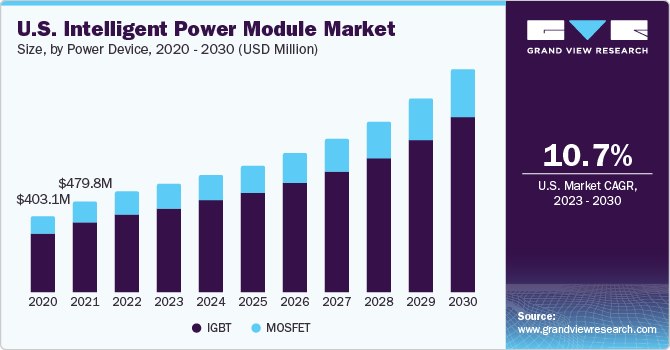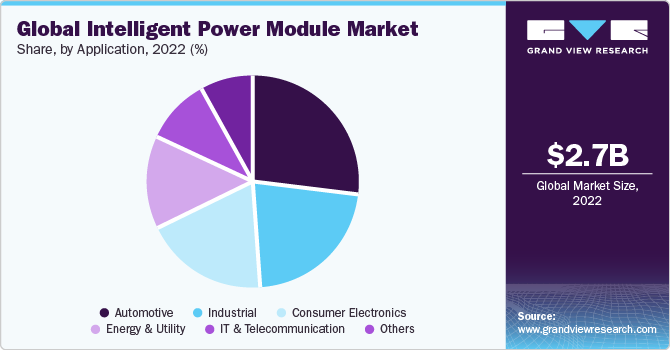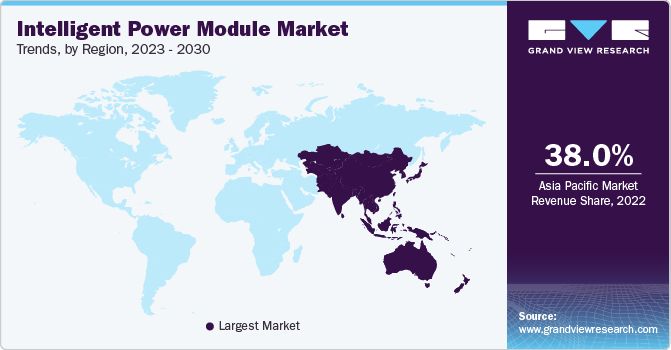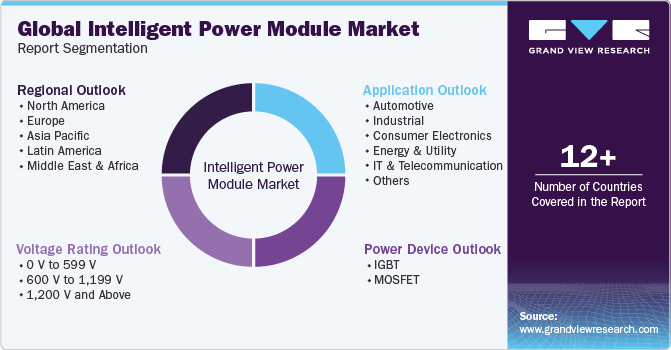
Intelligent Power Module Market Size, Share & Trends Analysis Report By Power Device (IGBT, MOSFET), By Voltage Rating (0 V To 599 V, 600 V To 1,199 V, 1,200 V And Above), By Application, By Region, And Segment Forecasts, 2023 - 2030
- Report ID: GVR-4-68040-158-6
- Number of Report Pages: 100
- Format: PDF
- Historical Range: 2017 - 2021
- Forecast Period: 2023 - 2030
- Industry: Semiconductors & Electronics
Intelligent Power Module Market Trends
The global intelligent power module market size was estimated at USD 2.71 billion in 2022 and is projected to grow at a compound annual growth rate (CAGR) of 11.2% from 2023 to 2030. The growth in sales of electric vehicles and growing adoption of renewable energy drives the market growth. Growing need for highly reliable, compact, and easy-to-use power devices aids market growth. An intelligent power module is a power-switching device that consists of a switching component, such as an Insulated-Gate Bipolar Transistor (IGBT) and Metal-Oxide-Semiconductor Field-Effect Transistor (MOSFET), and consists of additional protection and control circuitry. These modules improve system efficiency and make the design process simpler.

Europe consumes significant volumes of power semiconductors and is likely to witness a significant rise in demand for intelligent power modules. This can be attributed to the presence of prominent market players, such as Germany-based Infineon Technologies AG, Germany-based Semikron Danfoss, and Switzerland-based STMicroelectronics. Moreover, the growing adoption of renewable energy in the region is likely to have a positive impact on the market as these modules are used in renewable energy systems.
COVID-19 Impact
The COVID-19 pandemic had a significant impact on the market. Global implementation of social distancing norms to curb the spread of the COVID-19 virus led to changes in factory operations. Labor shortages and supply chain disruptions posed significant challenges for the electronics industry. According to the World Semiconductor Trade Statistics (WSTS GmbH), the discrete semiconductor market saw a year-over-year drop of around 0.3% from 2019 to 2020. Discrete semiconductors are used in intelligent power modules. Hence, the intelligent power module industry witnessed a decline during COVID-19 pandemic.
On the demand side, many industries faced challenges owing to travel restrictions and social distancing norms. According to the International Energy Agency (IEA), supply chain disruptions and lockdown measures led to delays in constructing renewable energy projects. Moreover, renewable energy consumption declined owing to business activity and travel restrictions. Intelligent power modules are used in renewable energy systems. Hence, negative impact of the COVID-19 pandemic on end-users of these devices negatively impacted the market’s growth.
Power Device Insights
In terms of power devices, the global market is classified into IGBT and MOSFET. The IGBT segment dominated the market, with a revenue share of more than 77% in 2022. It is expected to grow at the fastest CAGR of 11.4% throughout the forecast period. The segment’s growth can be attributed to the ability of IGBTs to withstand overloads and their wide range of applications in growing end-user industries, such as the automotive sector, which is witnessing a surge in Electric Vehicle (EV) adoption. An IGBT is a power transistor ideal for high-current and high-voltage applications. An IGBT is widely used for industrial applications such as Uninterruptible Power Supply (UPS) and inverter systems. They are also used in consumer applications, induction cookers, and air conditioners. IGBT-based modules manufactured by various market players are widely available. IGBTs offer benefits such as lower electromagnetic interference and thermal impedance in comparison to MOSFETs.
The MOSFET segment is anticipated to grow at a considerable CAGR of 10.4% over the forecast period. MOSFETs are suitable for low current, low voltage, and high switching frequency applications. The ability of MOSFETs to provide superior performance for high switching frequency applications is driving the segment’s growth. Moreover, new launches are likely to impact the segment’s growth positively. For instance, in April 2021, Cissoid announced the expansion of its 3-Phase Silicon Carbide (SiC) MOSFET Intelligent Power Module (IPM) product line. The company introduced liquid-cooled modules designed for E-mobility applications.
Voltage Rating Insights
In terms of voltage rating, the market is classified into 0 V to 599 V, 600 V to 1,199 V, and 1,200 V and above. The 600 V to 1,199 V segment dominated the market in 2022 with a revenue share of more than 49% in 2022. It is expected to grow at a CAGR of 11.0% throughout the forecast period. The wide range of use cases, such as major home appliances and industrial drives, covered under this voltage rating range and the wide availability of these modules drives segment growth. The majority of the intelligent power modules provided by market players have a voltage rating between 600 V and 1,199 V. For instance, Infineon Technologies AG offers IFCM20T65GD, a 650 V TRENCHSTOP IGBT-based intelligent power module. The module is designed for industrial drives and home appliances.
The 1,200 V and above segment is expected to grow at the fastest CAGR of 11.7% over the forecast period. The need for high-voltage intelligent power modules for various applications such as automotive, industrial automation, and Heating, Ventilation, and Air Conditioning (HVAC) drives the segment’s growth. Semiconductor Components Industries, LLC (onsemi)’s NFVA23512NP2T intelligent power module has a voltage rating of 1,200 V and is designed for hybrid and electric vehicles. The growing adoption of automation in industries and growth in renewable energy adoption drives segment growth.
Application Insights
In terms of application, the market is classified into automotive, industrial, consumer electronics, energy & utility, IT & telecommunication, and others segments. The automotive segment dominated the market in 2022 with a market share of more than 27% and is anticipated to witness the fastest CAGR of 12.1% over the forecast period. According to the International Energy Agency (IEA), the share of electric car sales in total car sales grew by 10% from 2020 to 2022. The growing adoption of hybrid electric and fully electric vehicles is contributing to the segment’s growth. Intelligent power modules serve various applications in the automotive industry, such as oil pumps, AC compressors, and electric vehicle on-board charging.

The consumer electronics segment is anticipated to grow at a considerable CAGR of 11.6% throughout the forecast period. The growing demand for intelligent and high-end products is driving segment growth. Intelligent power modules are used in various home appliances, such as air conditioners, washing machines, refrigerators, fans, air purifiers, and refrigerators.
Regional Insights
Asia Pacific dominated the market in 2022, with a market share of over 38.0%. It is expected to grow at the fastest CAGR of 12.1% throughout the forecast period. According to Ideal Power, Inc.’s 2022 annual report, Asia Pacific leads in the consumption of power semiconductors globally. This can be attributed to China being the leading automotive and passenger vehicle market globally. According to the l’Association des Constructeurs Européens d’Automobiles (ACEA), China held about 34% of the passenger cars produced worldwide in 2022. Moreover, the region has a significant amount of renewable energy installed capacity. Intelligent power modules have significant applications in the automotive and renewable energy sectors. Hence, the high automobile manufacturing activity and renewable energy installed capacity in the region drive the growth of the market in Asia Pacific.

North America is anticipated to grow at a considerable CAGR of 10.5% over the forecast period. North America has the presence of prominent market players, such as U.S.-based Semiconductor Components Industries, LLC (onsemi) and U.S.-based Alpha and Omega Semiconductor. North America’s developed technological infrastructure and high electronics manufacturing activity contribute to market growth in the region. Moreover, government initiatives and investments by companies to boost semiconductor and electronics manufacturing are likely to have a positive impact on the market. For instance, within a year of signing the U.S. government’s CHIPS and Science Act of 2022 in August 2022, companies announced investments of over USD 166 billion for semiconductor and electronics manufacturing.
Key Companies & Market Share Insights
The market is fragmented by key players functioning globally and helping the market to grow considerably. These players are adopting strategies such as product launches to gain a competitive edge. For instance, in August 2023, Fuji Electric Co., Ltd. announced the launch of the P633C Series, a third-generation of small intelligent power modules. The modules are designed to minimize the power consumption of devices such as machine tools and home appliances, which are mounted on it.
Key Intelligent Power Module Companies:
- Mitsubishi Electric Corporation
- Semiconductor Components Industries, LLC (onsemi)
- Infineon Technologies AG
- Fuji Electric Co., Ltd.
- Semikron Danfoss
- ROHM CO., LTD.
- STMicroelectronics
- Alpha and Omega Semiconductor
- Sensitron Semiconductor
- Ideal Power, Inc.
- Cissoid
Intelligent Power Module Market Report Scope
|
Report Attribute |
Details |
|
Market size value in 2023 |
USD 2.91 billion |
|
Revenue forecast in 2030 |
USD 6.11 billion |
|
Growth rate |
CAGR of 11.2% from 2023 to 2030 |
|
Base year for estimation |
2022 |
|
Historic year |
2017 - 2021 |
|
Forecast period |
2023 - 2030 |
|
Quantitative units |
Revenue in USD million/billion and CAGR from 2023 to 2030 |
|
Report coverage |
Revenue forecast, company ranking, competitive landscape, growth factors, and trends |
|
Segments covered |
Power device, voltage rating, application, region |
|
Regional scope |
North America; Europe; Asia Pacific; Latin America; Middle East & Africa |
|
Country scope |
U.S.; Canada; UK; Germany; France; India; China; Japan; South Korea; Australia; Brazil; Mexico; Kingdom of Saudi Arabia (KSA); UAE.; South Africa |
|
Key companies profiled |
Mitsubishi Electric Corporation; Semiconductor Components Industries, LLC (onsemi); Infineon Technologies AG; Fuji Electric Co., Ltd.; Semikron Danfoss; ROHM CO., LTD.; STMicroelectronics; Alpha and Omega Semiconductor; Sensitron Semiconductor; Ideal Power, Inc.; Cissoid |
|
Customization scope |
Free report customization (equivalent up to 8 analysts working days) with purchase. Addition or alteration to country, regional & segment scope |
|
Pricing and purchase options |
Avail customized purchase options to meet your exact research needs. Explore purchase options |
Global Intelligent Power Module Market Report Segmentation
This report forecasts revenue growth at global, regional, as well as at country levels and offers qualitative and quantitative analysis of the market trends for each of the segment and sub-segments from 2017 to 2030. For this study, Grand View Research has segmented the global intelligent power module market report based on power device, voltage rating, application, and region.

-
Power Device Outlook (Revenue, USD Million, 2017 - 2030)
-
IGBT
-
MOSFET
-
-
Voltage Rating Outlook (Revenue, USD Million, 2017 - 2030)
-
0 V to 599 V
-
600 V to 1,199 V
-
1,200 V and above
-
-
Application Outlook (Revenue, USD Million, 2017 - 2030)
-
Automotive
-
Industrial
-
Consumer Electronics
-
Energy & Utility
-
IT & Telecommunication
-
Others
-
-
Regional Outlook (Revenue, USD Million 2017 - 2030)
-
North America
-
U.S.
-
Canada
-
-
Europe
-
UK
-
Germany
-
France
-
-
Asia Pacific
-
India
-
China
-
Japan
-
South Korea
-
Australia
-
-
Latin America
-
Brazil
-
Mexico
-
-
Middle East & Africa
-
Kingdom of Saudi Arabia (KSA)
-
U.A.E.
-
South Africa
-
-
Frequently Asked Questions About This Report
b. The global intelligent power module market size was estimated at USD 2.71 billion in 2022 and is expected to reach USD 2.91 billion in 2023.
b. The global intelligent power module market is expected to grow at a compound annual growth rate of 11.2% from 2023 to 2030 to reach USD 6.11 billion by 2030.
b. Asia Pacific dominated the intelligent power module market with a share of over 38.0% in 2022. This is attributable to the presence of prominent market players and high automobile manufacturing activity.
b. Some key players operating in the intelligent power module market include Mitsubishi Electric Corporation, Semiconductor Components Industries, LLC (onsemi), Infineon Technologies AG, Fuji Electric Co., Ltd., Semikron Danfoss, ROHM CO., LTD., STMicroelectronics, Alpha and Omega Semiconductor, Sensitron Semiconductor, Ideal Power, Inc., and Cissoid.
b. Key factors driving the market growth include the growing adoption of electric vehicles and renewable energy.
We are committed towards customer satisfaction, and quality service.
"The quality of research they have done for us has been excellent."




